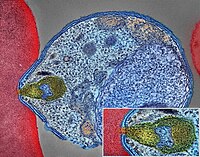
Photo from wikipedia
A combination of two Fc antibody features that leverage innate immune function predicts protection from malaria challenge after RTS,S/AS01 vaccination. Above and beyond antibody abundance Vaccine development can be hampered… Click to show full abstract
A combination of two Fc antibody features that leverage innate immune function predicts protection from malaria challenge after RTS,S/AS01 vaccination. Above and beyond antibody abundance Vaccine development can be hampered by a lack of clear correlates of protection. Suscovich et al. applied systems serology to samples from studies with the RTS,S/AS01 vaccine to understand which antibody functions were associated with protection from controlled malaria challenge, as magnitude of antibody response alone was not predictive. Systems serology revealed that a very small number of parameters involving engagement of innate immune cells could predict protection; this was confirmed with data from two additional studies. Experiments with antibodies in vitro or administered to mice further demonstrated the importance of Fc-mediated functions and innate immunity for protection from malaria parasites. This study emphasizes that finding correlates of protection requires investigation beyond measuring antibody abundance. Vaccine development has the potential to be accelerated by coupling tools such as systems immunology analyses and controlled human infection models to define the protective efficacy of prospective immunogens without expensive and slow phase 2b/3 vaccine studies. Among human challenge models, controlled human malaria infection trials have long been used to evaluate candidate vaccines, and RTS,S/AS01 is the most advanced malaria vaccine candidate, reproducibly demonstrating 40 to 80% protection in human challenge studies in malaria-naïve individuals. Although antibodies are critical for protection after RTS,S/AS01 vaccination, antibody concentrations are inconsistently associated with protection across studies, and the precise mechanism(s) by which vaccine-induced antibodies provide protection remains enigmatic. Using a comprehensive systems serological profiling platform, the humoral correlates of protection against malaria were identified and validated across multiple challenge studies. Rather than antibody concentration, qualitative functional humoral features robustly predicted protection from infection across vaccine regimens. Despite the functional diversity of vaccine-induced immune responses across additional RTS,S/AS01 vaccine studies, the same antibody features, antibody-mediated phagocytosis and engagement of Fc gamma receptor 3A (FCGR3A), were able to predict protection across two additional human challenge studies. Functional validation using monoclonal antibodies confirmed the protective role of Fc-mediated antibody functions in restricting parasite infection both in vitro and in vivo, suggesting that these correlates may mechanistically contribute to parasite restriction and can be used to guide the rational design of an improved vaccine against malaria.
Journal Title: Science Translational Medicine
Year Published: 2020
Link to full text (if available)
Share on Social Media: Sign Up to like & get
recommendations!